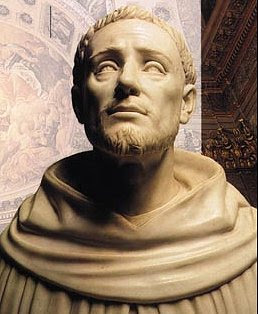Another controversy [...] centres around the period of Dominic's missionary activities in the Languedoc. This concerns the belief that he was the founder of the rosary after the form in which it is now so popularly practised by the faithful everywhere. Local tradition affirms that the commission to preach in this form of prayer was given him by the Mother of God herself in a vision and declares that the sanctuary of Notre Dame de Dreche, near Albi, was the scene of this remarkable supernatural manifestation.Also:
After the dispersal [from Prouille, on the feast of the Assumption of the Blessed Virgin, 15 August 1217] Dominic repaired to Toulouse. In the autumn, he clothed in the habit of the Order four new followers, Arnold of Toulouse, Romeo of Livia, Poncio of Samatan and Raymond of Mirapont who succeeded Fulk thirteen years later in the Episcopal See of Toulouse. He remained at St Romain for some time to attend to the training of these novices [...]Jean Guiraud [2] continues:
At Prouille, he [St Dominic] decided on the creation of the convent of the Preachers of Lyons. In the early days of December 1218 he sent to that town two friars: Arnold of Toulouse, whose trust in God was as inexhaustible as his zeal; and Romeo of Livia, "a religious of simple habits, humble bearing, gracious demeanour, of honied speech, and full of love to his neighbour".H. J. Warner [3] goes on to explain that
[Pope] Honorius III (February 11, 1218), addressed a letter of commendation to all archbishops, bishops, etc., on behalf of the Order of Preaching Friars. Probably to this commendation we owe the founding of the Convent of Lyons in 1218 by two friars, Arnauld of Toulouse and Romeo of Livia, of whom Arnauld acted as Prior, and was succeeded by Romeo in 1223.And in a footnote below:
Romeo became fifth Prior of Provence, of which he was a native and died at Carcassonne, 1261.Gerard K. Brady again:
Positive evidence to support the Dominican tradition [concerning the origin of the Rosary] is brought from the pages of the thirteenth-century chronicler, Bernard Gui, who connects the name of the friar, Romeo of Livia, one of those who had been trained in the religious life at Toulouse by Dominic himself, with a form of devotion which is instantly recognizable as something very close to the rosary. This friar, relates Bernard, being seized with an illness at Carcassonne, 'meditating on the Child Jesus and the Lady Mary, His Mother, and exhorting his brethren to a like devotion, fell asleep in the Lord, grasping tightly in his hands the knotted cord on which he was wont to count daily a thousand Aves'.Or in Latin (Brady gives the source as Monumenta Historica Ordinis Praedicatorum, Vol XXII, Rome 1953, p. 161):
Puerum Jesum et Dominam Mariam matrem ejus ruminans et fratribus inculcans, obdormivit in Domino, chordulam cum nodulis quibus mille Ave Maria solebat in die, firmiter manutenens.Brady concludes:
If, as it appears reasonable to assume, he had been accustomed during his lifetime to combine this meditation and recitation, we may identify at once in the unmistakable elements of vocal and mental prayer that twofold combination which is the dominant characteristic of the rosary as known today. This early apostle of the rosary, of whom Bernard writes that 'he glowed with the fervour of his devotion to the Virgin Mother of God', died in 1261 after a life of exemplary sanctity during which he held several important offices of the Order in the south of France.
[1] Saint Dominic : Pilgrim of Light / by Gerard K. Brady. - London : Burns & Oates, 1957
[2] Saint Dominic / by Jean Guiraud ; translated by Katharine de Mattos. - New York : Benziger Brothers, 1913
[3] The Albigensian Heresy / H. J. Warner. - (seems to be a reprint of a 1928 edition)





